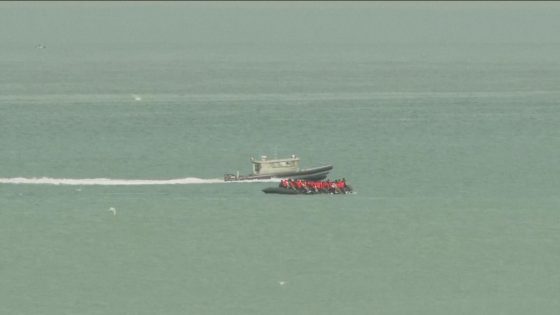The deaths of a dozen or more migrants in the English Channel do not change the fundamental realities of this migration route – and the people who want to use it.
Wednesday morning saw another boat carrying several dozen people appear to make another attempt to reach the UK from northern France.
Journalists on a beach in Wimereux, near Boulogne, broadcast live video of an inflatable boat carrying people out to sea.
And less than 24 hours after a makeshift craft ripped open from the bottom and capsized off the French coast, we found a group of 50-odd migrants sitting at the roadside after their attempt to make it to Britain had failed.
The majority were young men from countries like Iran and Iraq, but there were also small groups from countries like South Sudan and Sri Lanka.
A Kurdish woman caught our eye, with a bright orange lifejacket crammed beneath her cardigan. She had three small daughters, including five-year-old twins, who showed us painful-looking blisters on their toes.
Their mother explained that they had been walking long distances every night as the people smugglers tried to find them a boat.
No one we spoke to is turning back
I asked a Sri Lankan called Sayanthan whether he was aware that 12 people had died the previous day. He looked shocked and covered his face.
“No,” he said softly. Would he keep trying to reach the UK I asked? He nodded his head. No one we spoke to is turning back.
Read more:
Small boat crossings haven’t fallen – but real immigration story is elsewhere
Labour plan ‘not likely to stop small boats’
Nearly 500 migrants cross Channel in small boats on one day
Rubber boat ‘slashed by French police’
A man from South Sudan, who called himself Marco, said the rubber boat they expected to use had been slashed by the French police before they had a chance to use it.
“Why do they treat us like this?” he said. “I have been here for four months wearing the same clothes. I just want to go.”
“How many times have you tried to get to the UK?” I asked.
Marco said: “This is the first. This was the first time”. A look of disappointment emanated from his face.
People smugglers charge from anywhere between €2,000 to €3,000. Many cannot afford to make multiple attempts.
Eventually, a local bus was sent to pick them up. This bus route is unusual however, stopping at any number of unofficial campsites and clearings on the road which stretches up to Calais and Dunkirk.
This is the reality of a migrant’s life in northern France, a life of hardship and danger and an unnegotiable dream.
Source Agencies




